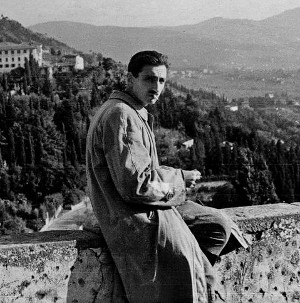




|
Marek
Edelman
(1919-2009)
 Polish Jew who grew up in
Warsaw. His father, a Social Revolutionist, died when he was
child, and his mother, a member of the Bund, when he was a
teenager. Edelman was an active member of the socialist,
anti-zionist Jewish Labor Bund before and during WWII. After
the Nazi occupation of Poland, he was forced into the Warsaw
Ghetto like so many other Jews. Edelman remained active with
the Bund inside the Warsaw Ghetto, organizing, spreading
information, and helping others escape raids. He participated
and played a leading role in the Warsaw Ghetto Uprising and
after it's definitive repression was one of the few people to
succeed in escaping through the sewers, with the assistance of
the leftist Polish resistance on the outside. Edelman
continued fighting iin the resistance against the Nazis,
eventually participating in the Warsaw uprising.
Edelman himself was radically
anti-zionist, staying true to the Bund's principles, and
viewed himself as equally Polish and Jewish and thus stayed in
his home country Poland after WWII. After the war he studied
to become a doctor to continue his commitment to saving lives.
Later was a prominent supporter of the Solidarność movement in
support of workers against the Polish government. Edelman was
also a supporter of Palestinian rights and critic of Israeli
occupation and often wrote that he felt Palestinian resistance
groups were fighting the same type of struggle he and the ŻOB
had fought in the Warsaw Ghetto.
The book, though short, provides a detailed account of the different stages of resistance within the Warsaw Ghetto. First Edelman describes the normal political activity which took place during the early life of the Ghetto and the simultaneous mass apathy and denial of the Jews living there. The Jewish Labor Bund, for it's part, was the first to advocate armed resistance to the Nazis and tried to convince others through it's underground press (the activities of which is detailed very well in the book) and by trying to convince other Jewish groups in the Ghetto of the necessity of armed resistance. Edelman also shows the true solidarity displayed by the non-Jewish Polish resistance groups which were active outside the Warsaw Ghetto: they were the major providers of weapons to the ŻOB, and they also helped some people to escape from the Ghetto. It should be pointed out that the Warsaw Ghetto Uprising was one of the first instances of organized armed resistance to the Nazis in Poland, and by far the largest and strongest to that point. The second stage which Edelman describes is the mass armed resistance to the Nazis which started in the beginning of 1943. Edelman describes how the Nazis would run away anytime they came up against organized resistance, when the jewish fighters normally only had a variety of improvised weapons like molotov cocktails and old guns with limited ammunition. Describing the major engagements of the resistance, Edelman shows the heroism and strength of people refusing to accept death passively, but who instead choose to die fighting against their oppressors. This book is a passionate and realistic argument for armed resistance in the face of mass murder and occupation, which should still be a lesson to us that peaceful means are useless and criminal when utilized against well-armed murderers. Shielding the Flame by Hannah Krall with Marek Edelman (1977): 117 pages. A continuation in some ways of Edelman's book The Ghetto Fights written in 1945, this book was written by Hannah Krall a Polish journalist with an interesting and unique way of writing. Whereas The Ghetto Fights is more of a straight forward report of the events that unfolded before and during the Warsaw Ghetto uprising, this book focuses on more personal subjects such as how Edelman was affected by his time in the Ghetto. Edelman was very open and honest in this book and talks of many things which others normally pass over because they are more daily and emotional aspects of life in the Ghetto, or else because they think people will misunderstand. The book also briefly details Edelman's life after WWII. A true tribute to the heroes of the Warsaw Ghetto uprising as well as to the brave and heroic Jews in the Ghetto who, before the uprising, bravely resisted the fascist slaughter in any way they could. |